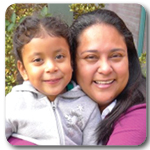Being a Parent of a Child of Colour: Part 1

What does it mean to be a child of colour? What role can parents play in shaping their kids' perceptions of the diverse world around them? The DLC is launching a three-part series "On Being a Parent of a Child of Colour" by guest blogger Renira Vellos.
Part 1: ON THE IMPORTANCE OF SKIN COLOUR
 Not long ago my 3-year old woke me to tell me that her best friend’s skin was white and hers was brown. Still half drowsy, I asked her if she had any other friends and to tell me what the color of their skin was. She named several of her friends, all the time describing the color of their skin as white. Jolted awake at the realization that my 3-year old was aware of colour and racial differences, I insisted that she name more friends until finally she mentioned one other little girl whose skin was brown. That my 3-year old had started talking about the colour of her skin and, more importantly, that she had noticed that she had few friends who had a similar colour of skin had not occurred to me.
Not long ago my 3-year old woke me to tell me that her best friend’s skin was white and hers was brown. Still half drowsy, I asked her if she had any other friends and to tell me what the color of their skin was. She named several of her friends, all the time describing the color of their skin as white. Jolted awake at the realization that my 3-year old was aware of colour and racial differences, I insisted that she name more friends until finally she mentioned one other little girl whose skin was brown. That my 3-year old had started talking about the colour of her skin and, more importantly, that she had noticed that she had few friends who had a similar colour of skin had not occurred to me.
Living in a society where as “liberal” parents we are careful not to talk about things that may be misinterpreted as racist or impolite, it seemed that even I, a graduate student who questions issues of social inequities in my research, had failed to notice the lenses through which I live my life. Yet, for a 3-year old these differences were already becoming clear. As an academic I can cite references for cognitive and physical development, and can quote research proving that children can identify differences in skin colour from younger than 6 months. Yet it seems I did not make the leap to thinking about what it might mean for my own child. I failed to make the connection between my child’s ability to see the difference and my own research about how race and skin colour can perpetuate inequality. I failed to think about what the research suggests about my child, who is not white, and the kinds of experiences and challenges she will face as she grows up in a society where the assumptions of equality are so deeply embedded, that they mask the differences that skin colour and race make.
What does it mean to be a “person of colour?”
This led me to ask the question: So what does it mean to be a “person of colour” in a modern society that strives to avoid conflict by being politically correct and not using skin colour as a descriptor? As I sat down to reflect on this question, I struggled over the term “person of colour.” I am uncomfortable with the idea that people can either be white or a person of colour. Apparently, it comes down to a dichotomy - a person can be one or the other, where being white is clearly defined but where “colour” is a range. The range in the term colour suggests that every person can be judged in relation to how far they are from white. The dichotomy also speaks to a history of colonialism entrenched with ideas of white biological superiority, where anyone who is not white, must, or should aspire to be white, and where being white comes with certain privileges that are not available to persons who are not white.
Yet, despite my hesitation and in the absence of a worthy alternative, I proceed to use the term “person of colour” with apprehension. So then, what should my response be to my child, a child of colour, when she asks about the colour of our skin? What colour you ask? Black? Not really, her skin is more a shade of honey brown, but not white, she is a “child of colour.” She is not yet asking what role colour plays in who we are and our experiences of the world. But I know the question is coming and all I have is my own experience to share with her. Experiences that I have struggled to “shield” her from, unconsciously, but given her observations and her burgeoning curiosity, I have not brought up the subject and by doing so I have inadvertently turned a blind eye to it.
The question of what it means to be a person of color in a modern society of ‘equals,’ should suggest that the colour of a person’s skin does not matter. Yet, the colour of our skin is a descriptor of our race or ethnicity, it is visible, and allows for quick and easy ways to identify “where” people are from or “what group” people are from. The colour of our skin comes with a history, it is not just the colour of one person’s skin, it is the experience that that skin colour has had in the lives of parents, grandparents, great-grandparents, and every other person whose skin has been of that colour throughout history. It is not one person with a particular colour of skin; it is a people with that colour of skin. It is a concept hard to understand but it is a reality that individuals of colour struggle with on a daily basis. To be seen as more than just the colour of their skin is a privilege often unnoticed by people with white skin. Terms like the “hyphenated-selves” come to mind where, for example, the word Canadian often assumes a person of white, Anglo-European descent, whereas everyone else is hyphenated, Indo-Canadians, Afro-Canadians, Chinese-Canadians, and the list goes on. Point is, the colour of our skin matters.
TO BE CONTINUED
A wife and mother, Renira Vellos is a Belizean graduate student in Human Development, Learning, and Culture at UBC. Her work spans across human development, alternative education, educational policy, and uses critical discourse analysis to examine how people are positioned within policy texts.







Comments
Post new comment